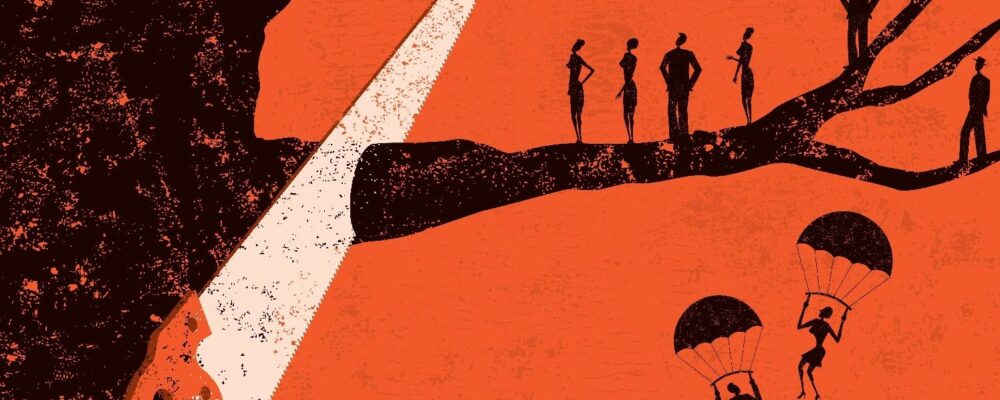
As the world’s sustainability concerns increasingly become corporate concerns, boards are often left wondering where their responsibility begins and how far it should extend. While we may not be personally responsible for the climate crisis, we are all part of the system that created it. Anyone advising boards and sitting on them has contributed to the machinery that got us here.
Regulations that hold companies accountable for climate change, like the EU Corporate Sustainability Reporting Directive and Corporate Sustainability Due Diligence Directive, trigger an ambivalent response. People wish to do better when they see their company’s impact. But they also react to regulation with anxiety and defensiveness, finding justifications to delay action.
Instead of operating at the “decision level” – focusing on actions and immediate consequences – board members need to shift to the “choice level” and reflect on who we want to be and the values that guide us. We need to allow ourselves to be more human in the boardroom, for human considerations and concerns to fuel our decisions.
This deeper commitment at the choice level is the only way to address the climate crisis. It means being comfortable with not having all the answers and still embarking on a path of change. It’s about wanting to make a difference, even when the path forward is unclear. For many in board roles, thinking of the future we leave for our children and their children is a strong reminder of our current responsibility, making the choice to initiate change inevitable.
Remaining solely at the decision level, where we minimise immediate risks and maximise short-term profits, will only prolong climate inaction.
Overcoming learning anxiety, learned helplessness and toxic schizophrenia
To get to the choice level, we need to confront a big obstacle in the boardroom: learning anxiety – the fear of learning something new. According to social psychologist Edgar Schein, we often worry that learning is too difficult, will make us look incompetent or force us to abandon old ways that have worked so far. This fear is holding us back from taking responsibility for the climate crisis. It threatens our self-esteem, and in extreme cases, our identity.
Another big barrier is “learned helplessness”. Erich Fromm, in his 1942 work, explored how newfound freedom can be overwhelming, leading individuals to seek refuge in submission. This fear of freedom, he later argued, manifests in the creation of “idols” – systems and structures that, while initially designed by us to serve human needs, ultimately come to dominate individuals as structures over and above us that cannot be changed.
In the corporate context, the relentless pursuit to maximise shareholder value – fuelled by excessive executive compensation tied to short-term gains – has become an unquestioned dogma. This “idolatry” can lead to a form of learned helplessness, where people feel powerless to challenge the system that they themselves helped create.
Finally, we often suffer from what I call toxic schizophrenia. Ethics, morals, how to be and do good, are reserved for the private sphere of families, friends and neighbours. Meanwhile, in the business world, we are supposed to follow what Max Weber called matter-of-fact laws of the marketplace, of competition and of what investors desire. Our humanity, our human experience and judgement, are often left outside the boardroom, leaving room only for decision-level considerations.
Moving to moonshot thinking
The scale of the challenge is undeniably daunting. As the chairman of the supervisory board of the Schiphol Group, I see this firsthand. At Schiphol Airport, 96 percent of carbon emissions originate from sources beyond our direct control, primarily the burning of kerosene by aircraft. This intricate web of dependencies – airlines reliant on aircraft manufacturers, manufacturers reliant on engine builders, all while we await the development of critical technologies like viable electric aircraft and sufficient green hydrogen infrastructure – creates a sense of inertia.
Every proposed change encounters fierce resistance from entrenched interests within the ecosystem. These stakeholders, clinging to the old paradigm, actively oppose any disruption to the status quo. The easy response would be to throw my hands up and say: “There’s nothing I can do now, nothing will change. I refuse to do that.”
What is needed for aviation, but also for many other industries, is ecosystem leadership – seeking to change the ecosystem as a whole rather than just being successful within it. This involves creating coalitions of the willing, experimenting with and investing in small changes now to show that change is possible, and designing pathways of transformation that are feasible over time.
Just as American President John F. Kennedy challenged the nation in 1962 to land a man on the moon before the end of the decade – an audacious goal that seemed impossible at the time – we need to set ambitious, even seemingly impossible, goals in the face of the climate crisis. Kennedy famously said, “we choose to go the moon”. Let us too choose to build a better future, not because it is easy, but because it is necessary. And, as Kennedy added, only this will bring out the best in us and push us to excel.
This “moonshot” mentality is critical for propelling the change we need. We need to shift our thinking towards what is needed in the future and envision something out of the ordinary. The goal is to let this extraordinary future inform our decisions today instead of getting caught up in the way things are and have always been done.
Leaders can paint a compelling vision of this future by using language to bring that future back to the present. By choosing language that inspires and motivates, they can shift mindsets, engage stakeholders and attract the talent needed to bring this vision to life.
We also need to diversify our thinking and redefine “long-term success” in the boardroom. Instead of being only focused on the here and now, we must engage in deeper discussions, reflecting on our values, our purpose and the kind of organisation we choose to be, the future we want to create for it and the world in which it operates.
Traditional meeting formats, with numerous agenda items and limited time for each, are not always helpful for this level of reflection. Every board can benefit from smaller group discussions in different meeting settings without tablets, board books and agendas. This, along with bringing in experts and stakeholders to inform and challenge us, can spur radically different dialogues.
To create a better future, we need to become human again in the boardroom. Only then will we truly excel and tap into our human creativity, ingenuity and determination to shape that future.
“INSEAD, a contraction of “Institut Européen d’Administration des Affaires” is a non-profit graduate-only business school that maintains campuses in Europe, Asia, the Middle East, and North America.”
Please visit the firm link to site





